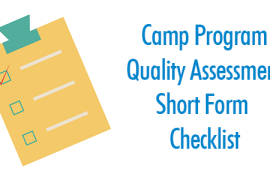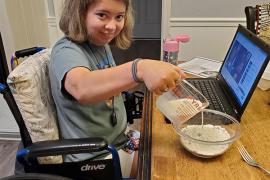Hello Camp Evaluators!
(A note on that: I received a comment once that said “Everything you write is for evaluators. I’m not an evaluator, so it does not apply to me.” To this I respond: I hear you! And I think you are indeed an evaluator. Do you gather information about your campers and camp program? And do you use that information to make decisions? Well, then you are an evaluator. Yes, an evaluator can be a formal role within an organization, and it is also something we all do, whether it is your formal role or not. So, when I say Hello Camp Evaluators, what I mean is: Hello! And you are welcome here, regardless of whether you call yourself an evaluator or not.)
Now to our topic for this post, which long overdue (apologies — I’ve been a bit sidetracked by this whole pandemic thing). Interestingly, the report we are discussing today is perhaps more relevant now than it was before the pandemic, something I’ll try to make clear as we review the report and its recommendations.
The National Academy of Sciences, Engineering, and Medicine (NAS) released its consensus study Shaping Summertime Experiences: Opportunities to Promote Healthy Development and Well-Being for Children and Youth in Fall 2019. Our friend and former ACA Research Team member Barry Garst, PhD, served on the consensus committee, and Steve Baskin, owner and director of ACA-accredited Camp Champions, presented to the committee on camps as a context for lasting learning.
While I encourage you to read more about how consensus studies are conducted and their valuable role in helping us identify and tackle critical issues, here are the high points:
- The National Academies of Sciences, Engineering, and Medicine is an independent nonprofit research organization created to “confront challenging issues for the benefit of society.”
- Consensus studies are sponsored by funders such as, in this case, Wallace Foundation and Robert Wood Johnson Foundation, interested in addressing critical issues. Funders sponsor the study but are otherwise not central to the research process or recommendations.
- Sponsors work with NAS researchers to identify the research questions, and then the NAS team recruits committee members representing “diverse disciplines who might not otherwise collaborate.”
- Then, through a collaborative and independent information gathering, the committee reports on the state of whatever issue they are studying, and, finally, generates recommendations based on their findings.
- Reports are shared publicly in a written report and a report summary.
While I encourage everyone to at least read the highlights, I will share what I think are the key takeaways for the camp community. Confession: I wrote most of these takeaways nearly 9 months ago shortly after the report was released. A lot has changed since then! If anything, the pandemic makes these takeaways even more relevant — and more urgent — than ever before. I’ll point out the “coronavirus implications” in italics.
The report includes healthy development & well-being in the title on purpose. The report explores summertime experiences and their relation to four outcome areas (academic learning, social and emotional development, physical and mental health, and safety). These are longtime strengths of camp, and we have ample evidence that camp promotes mental, emotional, social, and physical well-being. Let’s celebrate this by using this language when we promote camp to parents, communities, and funders. What does this mean in a pandemic? We must (MUST) demonstrate how every young person has access to healthy development and well-being through camp experiences. Now more than ever we need to measure and make visible these outcomes and commit to camp programs and systems that eliminate the inequities in healthy development and well-being that the pandemic has made so clear.
The committee’s guiding frameworks are systems & positive youth development (PYD). A systems approach assumes that young people learn and grow across multiple systems (family, community, school, out-of-school activities) and the better aligned these systems, the better the outcomes. The implications for us here is that we need think about camp as part of much larger systems — this means working more closely with community and national partners, among others. The PYD framework makes big and clear that we cannot and should not problematize youth. Youth have everything they need to develop into thriving adults, it is our responsibility to provide the supports and opportunities that nurture that naturally awesome trajectory. Summertime experiences are not about fixing youth who are sick, broken, or "at-risk," they are about engaging young peoples' interests and voice and supporting the innate need for belonging and social support. What does this mean in a pandemic? President and CEO of The Forum for Youth Investment and all-around youth development legend Karen Pittman sums it up best in her words cautioning against over-use of the term “summer learning loss”: by the time fall comes around, young people, with adult support, will have taken incredible steps to forge different relationships, make meaning in new situations, make progress towards new goals, and make a difference to themselves, their families, their peers, and their communities.
Local government should play a central role in ensuring safe and high quality experiences for youth. This is clearly an opportunity for camps to work with local governments to demonstrate the value of camp experiences and the role of accreditation promoting health, safety, and risk management. This report also suggests that local government should serve as a hub for youth-serving programs within communities. In some places, local government already does something like this, but it is not consistent across the country, nor is their role consistently grounded in best practices for safety and program quality. What does this mean during a pandemic? This might be a sore spot in light of the good-bad-and-ugly that some camps experienced with local government, namely local health departments, as they navigated Summer 2020. But do not let that stop you—if anything, the pandemic has demonstrated how important it is to form and maintain relationships with local officials (even if it means hundreds of unreturned phone calls. Don’t give up!).
Access access access. This report is all about access and the consequences of the summertime opportunity gap. There are two specific elements the report identifies that are very promising for camps. The first is around aligning with schools and school districts who are providing summer learning programs. The committee recommends that one way to increase access to summertime experiences is for schools and districts to provide more resources and support during the summer months. Many school districts already do this, and many more will be looking for partners in this work—a great opportunity for both day and overnight camps. The second actionable element is related to the Summer Food Service Program. Again, this is something many camps are already doing, but also a way more camps could more directly address summertime inequities. What does this mean during a pandemic? Everything. The pandemic has laid bare the inequities young people face in access to food, healthcare, developmental experiences, and just about everything else. Camps absolutely must emerge from this pandemic as a partner to families, schools, and communities as we work to eliminate these disparities. We’ve heard incredible stories about camps engaging their kitchens to provide food for local communities and innovative program options to meet young people and their families where they are—in their homes, local parks, or online.
And, of course, research! Verbatim from the report: “Although there is a robust research literature documenting the impact of summer on academic developmental trajectories, research on the impact of summer on other developmental domains examined by the committee is scarce, leaving many questions about best practices unanswered. This is a priority research need.” The ACA Research Team continues its efforts to examine and document the long-term impacts of youth and camp staff experiences, and we’ve added a robust research strategy specific to COVID-19. But the best and most valuable evidence comes from camps, which is why we are working hard to develop a new, powerful, and infinitely customizable approach to measuring camper outcomes. What does this mean during a pandemic? It means that we must commit to collecting information about campers and what they gain from their experiences at camp, and using that information to continuously improve programs, increase access, and demonstrate the value of camp. Research is no less important as we shift and bend and change programs to meet the new demands presented by COVID-19 — we just do it a little differently, and with a little more curiosity for this new and challenging/promising world we live in.
And a few additional tidbits from the report that are worth mentioning:
- Demand exceeds perceived opportunity — parents do not think summertime programs are accessible (financially or otherwise) but want these experiences for their child.
- Libraries and corporations (like large tech companies that provide summer camps, either for employee children or for the general public): Potential new partners?
- Medically-focused camping is well-acknowledged in the report — yay rah for our colleagues providing camps for young people with disabilities and chronic illnesses.
- Fun and interest are noted as an important link to healthy development and well-being, meaning the committee is not recommending we eliminate summer or encourage only summer school/summer learning programs. Seems to be solid evidence in the report for the need for a variety of options for families, and these options must be financially and logistically accessible and culturally relevant and affirming.
Friends and evaluators, this report could not be more timely and important for our work. I encourage you to read the report, or any/all of the terrific pieces discussing the report in a recent (and free!) issue of Journal of Youth Development.
Until next time, happy evaluating!
Laurie Browne, PhD, is the director of research at ACA. She specializes in ACA's Youth Outcomes Battery and supporting camps in their research and evaluation efforts. Prior to joining ACA, Laurie was an assistant professor in the Department of Recreation, Hospitality, and Parks Management at California State University-Chico. Laurie received her PhD from the University of Utah, where she studied youth development and research methods.
Photo courtesy of Farm & Wilderness in Plymouth, Vermont
Thanks to our research partner, Redwoods.
Additional thanks goes to our research supporter, Chaco.
The views and opinions expressed by contributors are their own and do not necessarily reflect the views of the American Camp Association or ACA employees.




